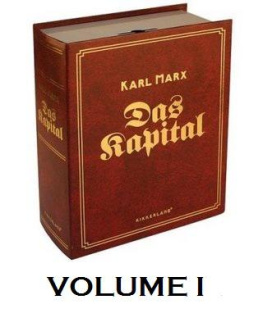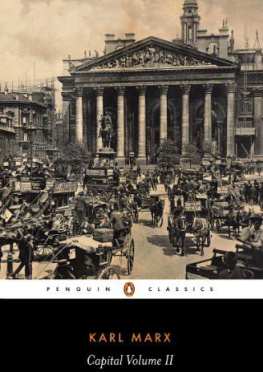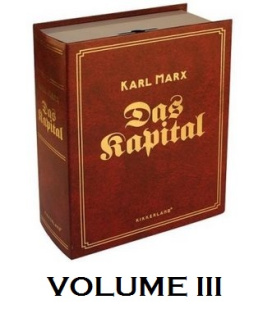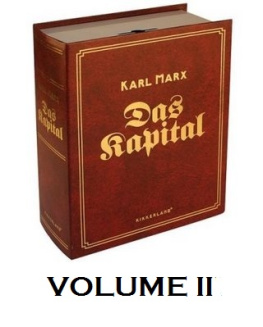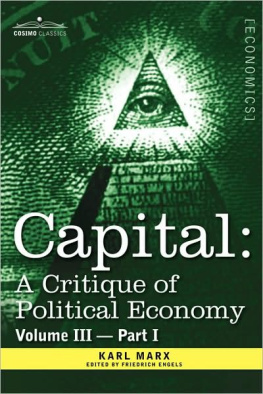Karl Marx - Capital Volume I
Here you can read online Karl Marx - Capital Volume I full text of the book (entire story) in english for free. Download pdf and epub, get meaning, cover and reviews about this ebook. year: 1867, publisher: Marxists Internet Archive, genre: Romance novel. Description of the work, (preface) as well as reviews are available. Best literature library LitArk.com created for fans of good reading and offers a wide selection of genres:
Romance novel
Science fiction
Adventure
Detective
Science
History
Home and family
Prose
Art
Politics
Computer
Non-fiction
Religion
Business
Children
Humor
Choose a favorite category and find really read worthwhile books. Enjoy immersion in the world of imagination, feel the emotions of the characters or learn something new for yourself, make an fascinating discovery.
- Book:Capital Volume I
- Author:
- Publisher:Marxists Internet Archive
- Genre:
- Year:1867
- Rating:3 / 5
- Favourites:Add to favourites
- Your mark:
- 60
- 1
- 2
- 3
- 4
- 5
Capital Volume I: summary, description and annotation
We offer to read an annotation, description, summary or preface (depends on what the author of the book "Capital Volume I" wrote himself). If you haven't found the necessary information about the book — write in the comments, we will try to find it.
Capital Volume I — read online for free the complete book (whole text) full work
Below is the text of the book, divided by pages. System saving the place of the last page read, allows you to conveniently read the book "Capital Volume I" online for free, without having to search again every time where you left off. Put a bookmark, and you can go to the page where you finished reading at any time.
Font size:
Interval:
Bookmark:
Capital
A Critique of Political Economy
VolumeI
Book One: The Process of Production of Capital
Firstpublished: in German in 1867, English edition first published in 1887;
Source: First English edition of 1887 (4th German edition changes included asindicated) with some modernisation of spelling;
Publisher: Progress Publishers, Moscow, USSR;
Translated: Samuel Moore and Edward Aveling, edited by Frederick Engels;
Transcribed: Zodiac, Hinrich Kuhls, Allan Thurrott, Bill McDorman, Bert Schultzand Martha Gimenez (1995-1996);
Proofed: by Andy Blunden and Chris Clayton (2008), Mark Harris (2010), DaveAllinson (2015).
Table of Contents
The work,the first volume of which I now submit to the public, forms the continuation ofmy Zur Kritik der PolitischenOekonomie (AContribution to the Criticism of Political Economy) published in 1859. Thelong pause between the first part and the continuation is due to an illness ofmany years duration that again and again interrupted my work.
Thesubstance of that earlier work is summarised in the first three chapters ofthis volume. This is done not merely for the sake of connexion andcompleteness. The presentation of the subject matter is improved. As far ascircumstances in any way permit, many points only hinted at in the earlier bookare here worked out more fully, whilst, conversely, points worked out fullythere are only touched upon in this volume. The sections on the history of thetheories of value and of money are now, of course, left out altogether. Thereader of the earlier work will find, however, in the notes to the firstchapter additional sources of reference relative to the history of thosetheories.
Everybeginning is difficult, holds in all sciences. To understand the first chapter,especially the section that contains the analysis of commodities, will,therefore, present the greatest difficulty. That which concerns more especiallythe analysis of the substance of value and the magnitude of value, I have, asmuch as it was possible, popularised.The value-form, whose fully developed shape is the money-form, is veryelementary and simple. Nevertheless, the human mind has for more than 2,000years sought in vain to get to the bottom of it all, whilst on the other hand,to the successful analysis of much more composite and complex forms, there hasbeen at least an approximation. Why? Because the body, as an organic whole, ismore easy of study than are the cells of that body. In the analysis of economicforms, moreover, neither microscopes nor chemical reagents are of use. Theforce of abstraction must replace both. But in bourgeois society, thecommodity-form of the product of labour or value-form of the commodity isthe economic cell-form. To the superficial observer, the analysis of these formsseems to turn upon minutiae. It does in fact deal with minutiae, but they areof the same order as those dealt with in microscopic anatomy.
With theexception of the section on value-form, therefore, this volume cannot standaccused on the score of difficulty. I presuppose, of course, a reader who iswilling to learn something new and therefore to think for himself.
Thephysicist either observes physical phenomena where they occur in their mosttypical form and most free from disturbing influence, or, wherever possible, hemakes experiments under conditions that assure the occurrence of the phenomenonin its normality. In this work I have to examine the capitalist mode ofproduction, and the conditions of production and exchange corresponding to thatmode. Up to the present time, their classic ground is England. That is thereason why England is used as the chief illustration in the development of mytheoretical ideas. If, however, the German reader shrugs his shoulders at thecondition of the English industrial and agricultural labourers, or in optimistfashion comforts himself with the thought that in Germany things are not nearlyso bad; I must plainly tell him, De te fabula narratur! [It is of you that the story is told. Horace]
Intrinsically,it is not a question of the higher or lower degree of development of the socialantagonisms that result from the natural laws of capitalist production. It is aquestion of these laws themselves, of these tendencies working with ironnecessity towards inevitable results. The country that is more developedindustrially only shows, to the less developed, the image of its own future.
But apartfrom this. Where capitalist production is fully naturalised among the Germans(for instance, in the factories proper) the condition of things is much worsethan in England, because the counterpoise of the Factory Acts is wanting. Inall other spheres, we, like all the rest of Continental Western Europe, suffernot only from the development of capitalist production, but also from theincompleteness of that development. Alongside the modern evils, a whole seriesof inherited evils oppress us, arising from the passive survival of antiquatedmodes of production, with their inevitable train of social and politicalanachronisms. We suffer not only from the living, but from the dead. Lemort saisit le vif! [The dead holds the living in hisgrasp. formula of French common law]
The socialstatistics of Germany and the rest of Continental Western Europe are, incomparison with those of England, wretchedly compiled. But they raise the veiljust enough to let us catch a glimpse of the Medusa head behind it. We shouldbe appalled at the state of things at home, if, as in England, our governmentsand parliaments appointed periodically commissions of inquiry into economicconditions; if these commissions were armed with the same plenary powers to getat the truth; if it was possible to find for this purpose men as competent, asfree from partisanship and respect of persons as are the Englishfactory-inspectors, her medical reporters on public health, her commissionersof inquiry into the exploitation of women and children, into housing and food.Perseus wore a magic cap down over his eyes and ears as a make-believe thatthere are no monsters.
Let us notdeceive ourselves on this. As in the 18th century, the American war ofindependence sounded the tocsin for the European middle class, so that in the19th century, the American Civil War sounded it for the European working class.In England the process of social disintegration is palpable. When it hasreached a certain point, it must react on the Continent. There it will take aform more brutal or more humane, according to the degree of development of theworking class itself. Apart from higher motives, therefore, their own mostimportant interests dictate to the classes that are for the nonce the rulingones, the removal of all legally removable hindrances to the free developmentof the working class. For this reason, as well as others, I have given so largea space in this volume to the history, the details, and the results of Englishfactory legislation. One nation can and should learn from others. And even whena society has got upon the right track for the discovery of the natural laws ofits movement and it is the ultimate aim of this work, to lay bare theeconomic law of motion of modern society it can neither clear by bold leaps,nor remove by legal enactments, the obstacles offered by the successive phasesof its normal development. But it can shorten and lessen the birth-pangs.
To preventpossible misunderstanding, a word. I paint the capitalist and the landlord inno sense couleur de rose [i.e., seen throughrose-tinted glasses] . But here individuals are dealt with only in so faras they are the personifications of economic categories, embodiments ofparticular class-relations and class-interests. My standpoint, from which theevolution of the economic formation of society is viewed as a process ofnatural history, can less than any other make the individual responsible forrelations whose creature he socially remains, however much he may subjectivelyraise himself above them.
Font size:
Interval:
Bookmark:
Similar books «Capital Volume I»
Look at similar books to Capital Volume I. We have selected literature similar in name and meaning in the hope of providing readers with more options to find new, interesting, not yet read works.
Discussion, reviews of the book Capital Volume I and just readers' own opinions. Leave your comments, write what you think about the work, its meaning or the main characters. Specify what exactly you liked and what you didn't like, and why you think so.

